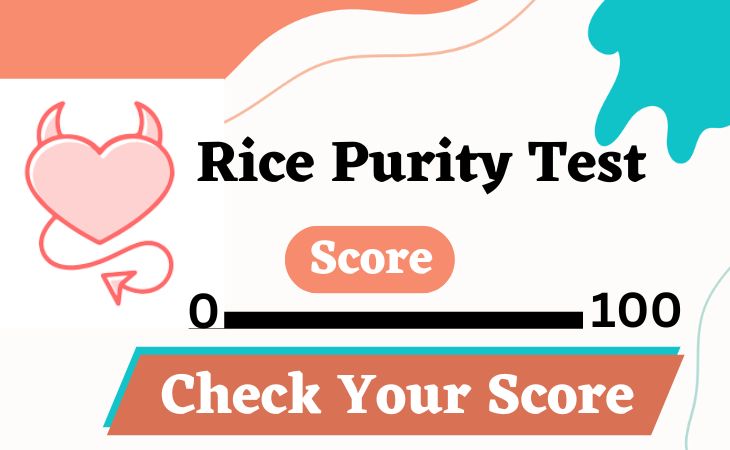Rice Purity Test 2023

What Is The Rice Purity Test?
The Rice Purity Test is a self-assessment questionnaire consisting of 100 questions that cover everything a student might have or is engaged in.
It’s like an adult version of the SATs, but instead of measuring your intelligence, it measures how much of a hot mess you are.
The goal of the Rice Purity Test is to determine just how pure (or impure) you are, with scores ranging from 0 to 100.
Think of it like a purity ring, but instead of a piece of jewelry, it’s a number that tells the world just how much of a freak you are.
The test has been around since 1924, when Rice University introduced it to measure the maturity and innocence level of their students.
I guess they wanted to make sure their students weren’t just partying all the time, but were also good, upstanding citizens. Or maybe they just wanted to make sure no one was having too much fun.
So, whether you’re a goody two-shoes with a score of 100, or a hot mess with a score of 0, the Rice Purity Test is here to judge you. Just remember, it’s all in good fun (or is it?).
And who knows, maybe taking the test will make you reflect on your choices and help you make better ones in the future. Or, more likely, it will just make you feel really judged and guilty. But hey, that’s college life for you!
What Does The Rice Purity Test Score Mean?

The Rice Purity Test is often seen as a rite of passage for college students, as it can provide a sense of shared experience and community.
Many students compare their scores with their peers, and some even use the test as a way to bond and share stories about their past experiences.
A score of 100 on the Rice Purity Test is considered rare, as it means that the person has never engaged in any of the behaviors listed on the questionnaire.
While a score of 100 is not necessarily something to aspire to, it can serve as a reminder that it is possible to make choices that prioritize one’s values and well-being.
Score 90-99:
For most students, scores in the 90-99 range are more common. These scores suggest that the person has had some minor experiences in areas such as relationships, but has generally made choices that reflect a higher level of purity.
Students with these scores may still feel a sense of pride in their accomplishments, while recognizing that there is always room for improvement.
Score 80-89:
Scores in the 80-89 range suggest that the person has had slightly more experience in areas of relationships.
While these experiences may have been limited to experimentation or a brief period of time, the person may still feel a sense of regret or shame about their past choices.
Score 70-79:
Scores in the 70-79 range indicate that the person may have engaged in more risky or dangerous behaviors.
Students with these scores may have had some negative consequences as a result of their choices, and may be looking for ways to make healthier choices in the future.
Score 60-69:
Scores in the 60-69 range suggest that the person has had substantial experience in several areas, and may have engaged in more serious or risky behaviors.
These scores indicate that the person may have had a significant impact on their life as a result of their choices, and may be looking for ways to make positive changes.
Score 50-59:
Scores in the 50-59 range suggest that the person has had extensive experience in many areas, and may have engaged in behaviors that are considered more extreme or dangerous.
Students with these scores may have had a significant impact on their life as a result of their choices, and may be looking for ways to make significant changes.
Score 0-49:
Scores in the 0-49 range indicate that the person has had a high level of experience in almost all areas, and may have engaged in behaviors that are considered very risky or dangerous.
Students with these scores may have experienced serious negative consequences as a result of their choices, and may be looking for ways to make significant changes in their life.
How Does The Rice Purity Test Work?
The Rice Purity Test is simple to take and easy to understand. Participants simply go through the list of questions and answer truthfully. They are asked about their experiences potentially controversial topics.
The questions are designed to provide a comprehensive look at a person’s life, and the answers are used to determine their level of innocence or purity.
What Is The Average Rice Purity Test Score?
The average Rice Purity Test score varies widely depending on a number of factors, including the demographic of the participants, the cultural background of the participants, and the specific questions that are asked.
In general, however, most people score between 30 and 70. A score of 100 is considered to be the highest level of purity, while a score of 0 is considered to be the lowest.
How To Calculate Rice Purity Test?
Calculating the Rice Purity Test is simple. Participants simply add up the number of questions they answered truthfully and divide that number by 100.
This gives them their final score, which is expressed as a percentage. The higher the score, the more pure or innocent the person is considered to be.
What Does MPS Stand For Rice Purity Test?
MPS is an acronym that stands for “maximum possible score.” This term is used to refer to the highest possible score that can be achieved on the Rice Purity Test.
A score of 100 is considered to be the MPS, and it represents the highest level of innocence or purity that can be achieved.
What Is A Good Score On The Rice Purity Test?

A good score on the Rice Purity Test is subjective and depends on a number of factors, including the cultural background of the participants, their personal beliefs and values, and their own definition of what constitutes a good score.
In general, however, a score of 70 or higher is considered to be a good score, while a score of 50 or lower is considered to be a poor score.
Is The Rice Purity Test Safe?
The Rice Purity Test is not a scientifically validated test and its results should not be taken seriously. The questions can be intrusive and personal in nature, and some participants may find them offensive.
Additionally, the test is not designed to provide accurate or meaningful information about an individual’s personality or behavior.
As such, it is not considered to be a safe or reliable tool for measuring an individual’s level of innocence or purity.
Conclusion:
The rice purity test offers a unique and entertaining way to reflect on your life experiences. While it may not provide a definitive measure of innocence, it encourages self-reflection and introspection.
So, whether you’re taking the test for fun or for personal insights, remember that your score is just a number, and the true essence of your character goes far beyond it.
As you navigate the world of online quizzes and self-discovery, the rice purity test stands as a testament to the human tendency to explore and understand ourselves in creative and unexpected ways.
FAQs:
1. What is the rice purity test?
The rice purity test is an online quiz that assesses a person’s innocence based on their life experiences and actions.
2. How many questions are in the rice purity test?
The test typically consists of around 100 questions, covering a wide range of topics.
3. Is the rice purity test accurate?
The test provides a fun and introspective way to reflect on your experiences, but it shouldn’t be taken as a serious measure of your character.
4. Can I retake the rice purity test?
Certainly! You can take the test multiple times to compare your scores and see how your answers may have changed over time.
5. How do I interpret my rice purity score?
Your score is a numerical representation of your innocence level, with a higher score indicating a higher level of innocence.
6. Is the rice purity test suitable for all ages?
While the test is available online, some questions may touch on mature topics, so it’s advisable for adults and older teenagers.